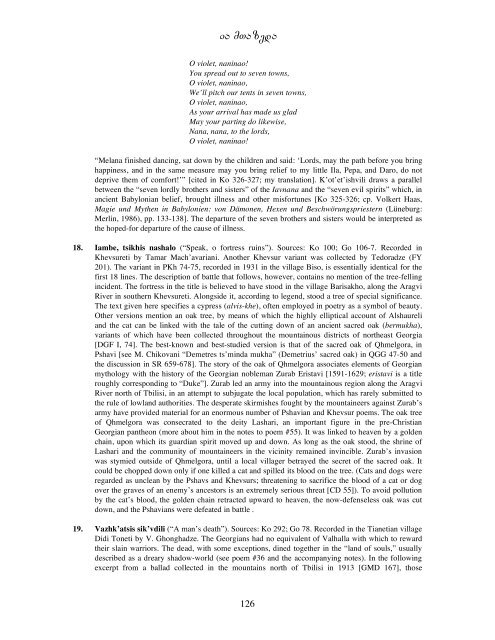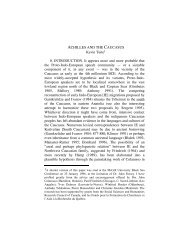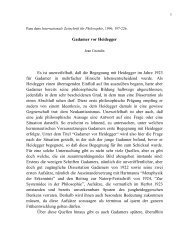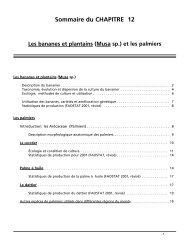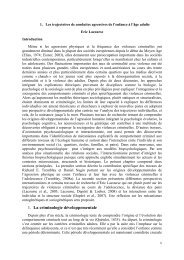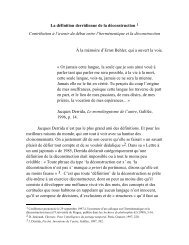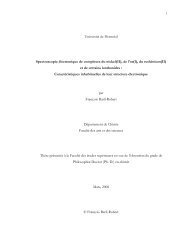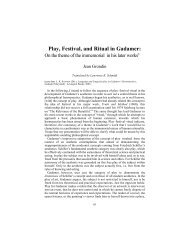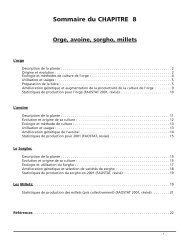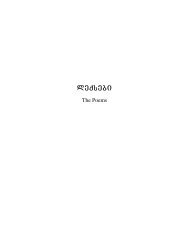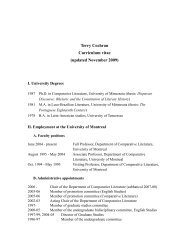You also want an ePaper? Increase the reach of your titles
YUMPU automatically turns print PDFs into web optimized ePapers that Google loves.
ia mtazeda<br />
O violet, naninao!<br />
You spread out to seven towns,<br />
O violet, naninao,<br />
We’ll pitch our tents in seven towns,<br />
O violet, naninao,<br />
As your arrival has made us glad<br />
May your parting do likewise,<br />
Nana, nana, to the lords,<br />
O violet, naninao!<br />
“Melana finished dancing, sat down by the children and said: ‘Lords, may the path before you bring<br />
happiness, and in the same measure may you bring relief to my little Ila, Pepa, and Daro, do not<br />
deprive them of comfort!’” [cited in Ko 326-327; my translation]. K’ot’et’ishvili draws a parallel<br />
between the “seven lordly brothers and sisters” of the Iavnana and the “seven evil spirits” which, in<br />
ancient Babylonian belief, brought illness and other misfortunes [Ko 325-326; cp. Volkert Haas,<br />
Magie und Mythen in Babylonien: von Dämonen, Hexen und Beschwörungspriestern (Lüneburg:<br />
Merlin, 1986), pp. 133-138]. The departure of the seven brothers and sisters would be interpreted as<br />
the hoped-for departure of the cause of illness.<br />
18. Iambe, tsikhis nashalo (“Speak, o fortress ruins”). Sources: Ko 100; Go 106-7. Recorded in<br />
Khevsureti by Tamar Mach’avariani. Another Khevsur variant was collected by Tedoradze (FY<br />
201). The variant in PKh 74-75, recorded in 1931 in the village Biso, is essentially identical for the<br />
first 18 lines. The description of battle that follows, however, contains no mention of the tree-felling<br />
incident. The fortress in the title is believed to have stood in the village Barisakho, along the Aragvi<br />
River in southern Khevsureti. Alongside it, according to legend, stood a tree of special significance.<br />
The text given here specifies a cypress (alvis-khe), often employed in poetry as a symbol of beauty.<br />
Other versions mention an oak tree, by means of which the highly elliptical account of Alshaureli<br />
and the cat can be linked with the tale of the cutting down of an ancient sacred oak (bermukha),<br />
variants of which have been collected throughout the mountainous districts of northeast Georgia<br />
[DGF I, 74]. The best-known and best-studied version is that of the sacred oak of Qhmelgora, in<br />
Pshavi [see M. Chikovani “Demetres ts’minda mukha” (Demetrius’ sacred oak) in QGG 47-50 and<br />
the discussion in SR 659-678]. The story of the oak of Qhmelgora associates elements of Georgian<br />
mythology with the history of the Georgian nobleman Zurab Eristavi [1591-1629; eristavi is a title<br />
roughly corresponding to “Duke”]. Zurab led an army into the mountainous region along the Aragvi<br />
River north of Tbilisi, in an attempt to subjugate the local population, which has rarely submitted to<br />
the rule of lowland authorities. The desperate skirmishes fought by the mountaineers against Zurab’s<br />
army have provided material for an enormous number of Pshavian and Khevsur poems. The oak tree<br />
of Qhmelgora was consecrated to the deity Lashari, an important figure in the pre-Christian<br />
Georgian pantheon (more about him in the notes to poem #55). It was linked to heaven by a golden<br />
chain, upon which its guardian spirit moved up and down. As long as the oak stood, the shrine of<br />
Lashari and the community of mountaineers in the vicinity remained invincible. Zurab’s invasion<br />
was stymied outside of Qhmelgora, until a local villager betrayed the secret of the sacred oak. It<br />
could be chopped down only if one killed a cat and spilled its blood on the tree. (Cats and dogs were<br />
regarded as unclean by the Pshavs and Khevsurs; threatening to sacrifice the blood of a cat or dog<br />
over the graves of an enemy’s ancestors is an extremely serious threat [CD 55]). To avoid pollution<br />
by the cat’s blood, the golden chain retracted upward to heaven, the now-defenseless oak was cut<br />
down, and the Pshavians were defeated in battle .<br />
19. Vazhk’atsis sik’vdili (“A man’s death”). Sources: Ko 292; Go 78. Recorded in the Tianetian village<br />
Didi Toneti by V. Ghonghadze. The Georgians had no equivalent of Valhalla with which to reward<br />
their slain warriors. The dead, with some exceptions, dined together in the “land of souls,” usually<br />
described as a dreary shadow-world (see poem #36 and the accompanying notes). In the following<br />
excerpt from a ballad collected in the mountains north of Tbilisi in 1913 [GMD 167], those<br />
126


